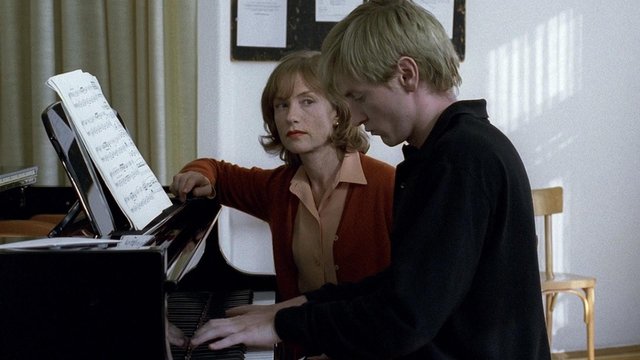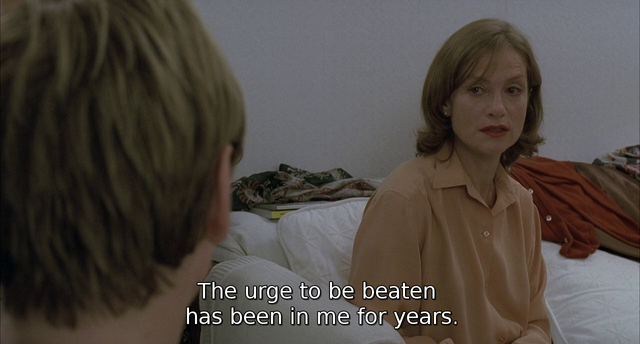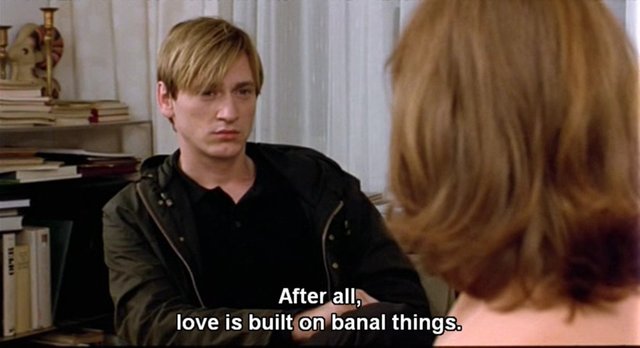
The Piano Teacher (Michael Haneke, 2001) is a considered exercise in empathy. It reflects upon the complex ways in which behaviours and roles can be repeated and adapted by individuals, within and without traditional boundaries. Boiled down here is a symbiotic spiral of action and repression perpetuated by social norms and expectations. This film presents a compelling slice of life whilst interrogating with extraordinary discipline the formal predicates which encase both the film and its protagonist. (Senses of Cinema)
ESSAY
The protagonist of La Pianiste is Erika Kohut, a middle-age piano teacher. Erika teaches at a conservatory, having never quite managed to make a career for herself as concert pianist, for reasons that are not spelled right out in the film: possibly it's just that she's not quite good enough. Standing like a well-groomed martinet over her students, she seems to be willing them to fail. Erika lives with her mother and her father is dying in a mental institution. There are many words that one could use to describe this mother/daughter relationship. 'Healthy' is not one of them
Haneke presents her sexual masochism as a pathological sublimation of her repressed emotions and abusive relationship with her mother. It seems that every one of Erika’s scenes of “perversion” are represented as effects whose causation lies in the traumatic events of her personal life. It is after she gets into an argument with her over-protective mother during a rehearsal that she goes to the peep show to watch porn. Soon, a young self-assured Walter enters the picture.
Intelligent, handsome and cockily charming, Walter becomes Erika's lover, and for one brief moment it seems he might be her salvation. But the moment passes, and when Walter is introduced to Erika's inner world of sadism and degradation, the chance of any light penetrating the intolerable depression disapear.

The irony of Erika's perversity is the graceful surrounding of noble music and culture and is one of the more compelling attributes of the film.
Her activities may seem grotesque, but they are essentially harmless, until Erika becomes more extreme, elegantly quoting Schubert on madness and “the twilight of the mind” in one scene and cutting her genitals with a razorblade in the next. Then she turns her violence on others, jealously filling one of her gifted student (Ana) coat pockets with broken glass in order to mutilate her hands.
Erika's exploratory but unexplained story is told from behind the walls of her apartment, which has been turned into an asylum without any possible escape. It's a place where porn and Schubert fuse together and one cannot beat out the other in her twisted mind, as she plays the piano by the rules she wholly believes but is nevertheless on the road to self-destruction. She will in the end stab herself near the heart for some kind of perverted martyrdom to prove her love of music. Why she can't relate to people but by some set of rules, is just one of her many problems. But it is this problem that leads her on to a point where she loses track of where art and life take separate roads, and she's left only with madness. Her music rules can't help her in real life, as they also couldn't help either Schubert or Schumann.

Why are there only two ways to have sex with somebody in The Piano Teacher— the “normal” romantic way or the sick, “transgressive” way? And why does the film make Walther look merely troubled, while Erika is downright psychotic, as if that’s the inevitable destination of dabblers in deviance? Great art-porn appeals to our stereotypical notions of kinky behavior and playing with our disgust, challenging us by making us uncomfortable, forcing us to go one step further and question the nature of what we think is deviant and why.
Shot with many close-ups, director Haneke explores a deep rooted psychological drama, backed with graceful Schubert music.
One might question if Haneke has gone too far and created a character that is too sick and demented for audiences to identify with in any way. But we know that's not true.
The most controversial element of "The Piano Teacher" is that there might be something buried deep in all of us that connects us closer to Erika than we would like. This uncomfortable thought will linger long after the film. To get at the root psychology of this film would require many sessions on the couch of Dr. Freud.
Oh!! How immotional film director and photographer you are!!
Downvoting a post can decrease pending rewards and make it less visible. Common reasons:
Submit